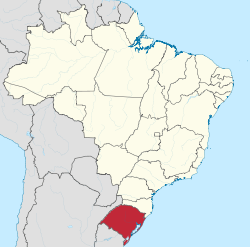Gaúcho dialect
Gaúcho (Portuguese pronunciation: [gaˈuʃo]), more rarely called Sulriograndense, is the Brazilian Portuguese term for the characteristic accent spoken in Rio Grande do Sul, Brazil's southernmost state, including its capital, Porto Alegre. It is heavily influenced by Spanish and somewhat influenced by Guarani, Hunsrückisch, Venetian and other native languages.
| Gaúcho dialect | |
|---|---|
| Gaúcho / Gauchês / Guasca | |
Indo-European
| |
| Language codes | |
| ISO 639-3 | – |
 | |
Phonology
Its phonology is heavily similar to Rioplatense Spanish, including its characteristics of the speaking syllabic rhythm, use of L-vocalization in the syllable coda, and little use nasal vowels, basically restricted to the monophthong /ɐ̃/ and the diphthongs /ɐ̃w̃, õj̃/.
Another feature in the heart of Rio Grande do Sul is the absence of vowel reduction with word-final ⟨e⟩ (for example, leite is /ˈlejte/ instead of /ˈlejt⁽ᶴ⁾i/). In some other cities in this region, the nasal monophthong /ɐ̃/ is heightened to /ə̃/.
Grammar
Grammatically, one of its most notable features is the use of tu, instead of você, with the verb conjugating differently: e.g. tu corre and tu lava instead of *tu corres and *tu lavas. However, use of the standard você is also not rare. The same feature also occurs in other dialects of Brazilian Portuguese.
Vocabulary
| Gaúcho | Standard Brazilian Portuguese |
Meaning |
|---|---|---|
| aspa | chifre | horn |
| avio | isqueiro | lighter |
| bá! | puxa!, nossa! | exclamation of surprise |
| bagual | excelente, ótimo | excellent, very good |
| bergamota | tangerina, mexerica | tangerine |
| bodoque | estilingue | slingshot |
| campear | procurar | to look for |
| chavear | trancar | to lock |
| chimia | geleia | jam |
| cusco | cachorro, cão | dog |
| fatiota | terno | suit (noun) |
| inticar | provocar | to provoke |
| remolacha | beterraba | beetroot |
| tchê! | cassilda!, caramba! | sentence intensifier or you (i.e. "Hey, you *name*") |
| terneiro | bezerro | calf |
| tri | legal, bacana | nice, cool |
| vivente | ser, pessoa | living being |
| a la pucha! | praises what was heard[1][2] |
References
- Dicionário de Regionalismos do Rio Grande do Sul, de Zeno e Rui Cardoso Nunes, editado por Martins Livreiro
- Possenti, Sírio (2012-12-27). "Sírio Possenti explica o que são dialetos". Revista Ciência Hoje. Retrieved 2013-01-03.